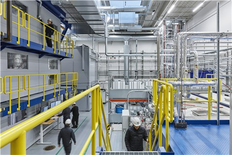
Project Overview
Braskem and Haldor Topsoe have achieved their first demo-scale production of bio-based monoethylene glycol (MEG) from sugar. This milestone is part of the MOSAIKT technology development, which has been progressing on schedule at the demonstration unit in Lyngby, Denmark.
Demonstration Unit
The demonstration unit, operational since 2019, aims to showcase the key design features of the technology that converts sugar into renewable MEG. Since its inception, the remaining process units have been built and optimized for production.
MEG and Market Impact
MEG is a crucial raw material for polyethylene terephthalate (PET), widely used in textiles and packaging, especially beverage bottles. Currently, MEG is primarily derived from fossil-based feedstocks like naphtha, gas, or coal. The global MEG market is valued at approximately $25 billion.
Co-Production of MPG
The technology will also produce monopropylene glycol (MPG) in smaller quantities. MPG has diverse applications, including unsaturated polyester resins (UPR) used in construction materials and cosmetic products.
Next Steps
The next phase involves providing samples to strategic partners for testing and validation. The results from the demonstration plant and product validation will be crucial for deciding on commercial-scale deployment.

